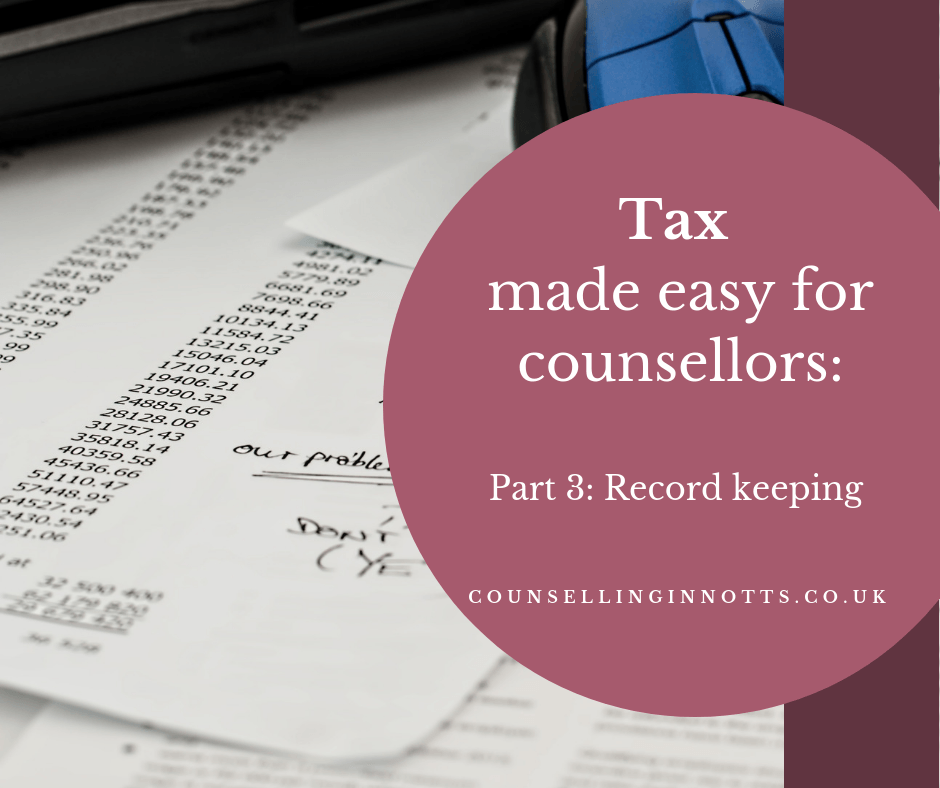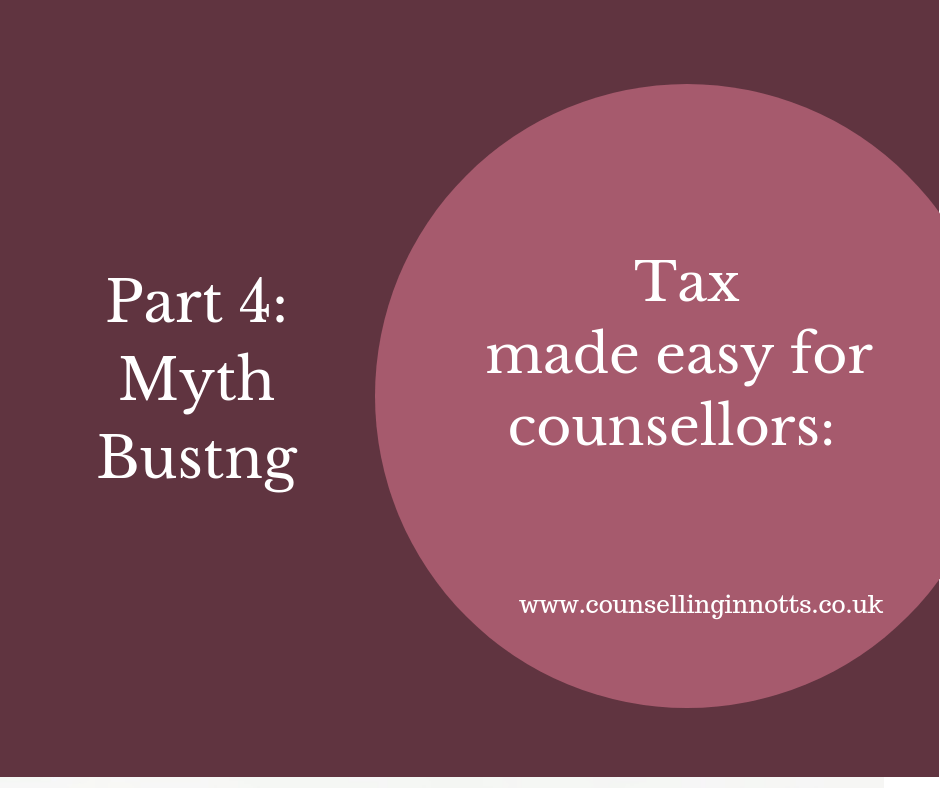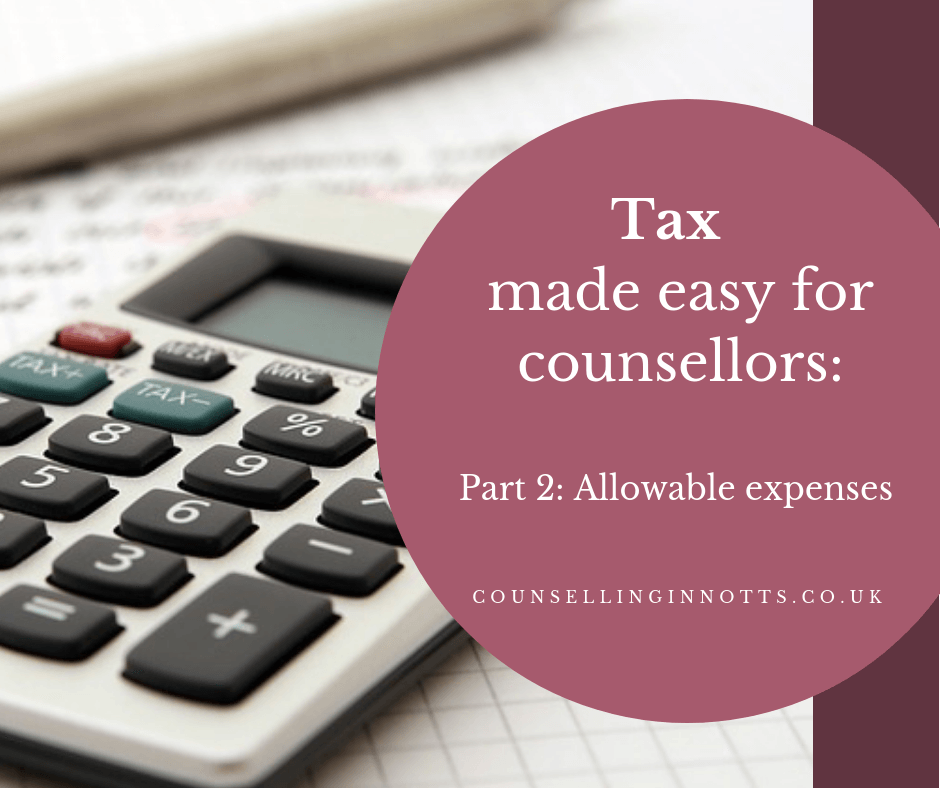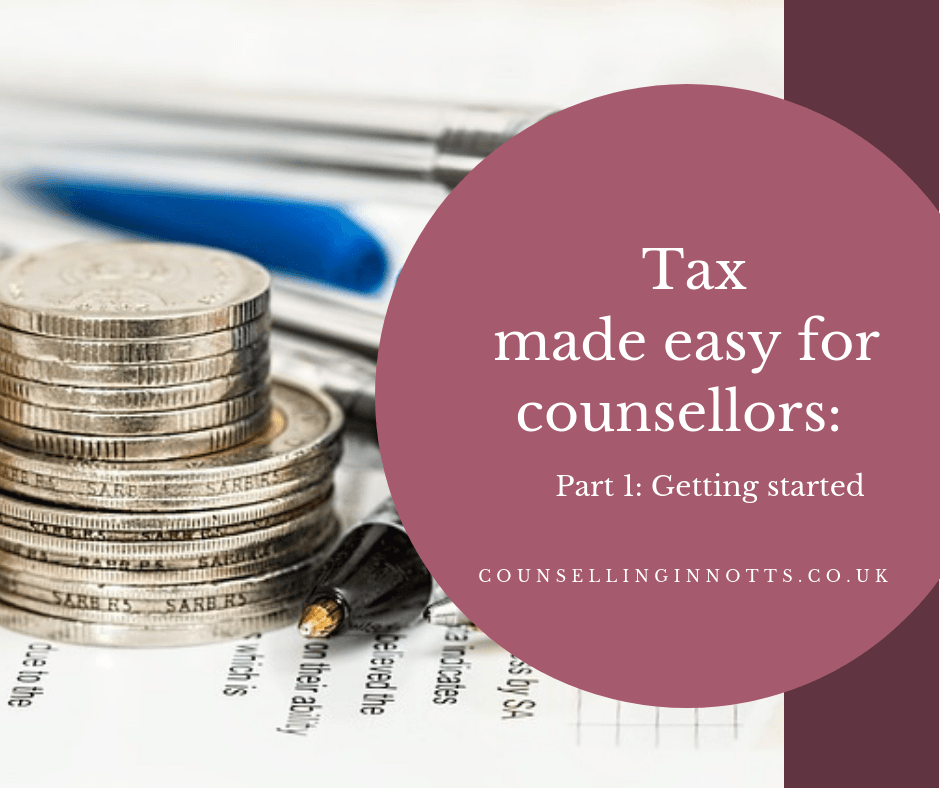Tax made easy for counsellors
- By Karen Emery
- •
- 01 Feb, 2019
- •
Blog 3: Record Keeping

Welcome to blog 3. Record keeping
So today’s blog is basically about shoe boxes. Hands up who keeps their receipts and paperwork in a show box?
Many people do and that’s fine. Find a way that works for you. As with blog 1 getting started if admin and record keeping is your worst nightmare then seriously consider paying for a book keeper. Take the stress out of life and remember it’s a tax allowable expense.
Why are you keeping records?
Is it currently a total shock to you when you get your tax bill, do you generally have no idea how much you’ve earned or how much your tax will be? That’s why you keep records so you know your figures. Oh and because the tax office says you have to and they can audit your paper work anytime they like. Oh and fine you if your records aren’t accurate.
https://www.gov.uk/self-employed-records
Should you keep regular tax records?
Ok hands up again who says every year I’m going to do my accounts weekly and then like a new year resolutions that goes out the window after week 2. Yep that’s so me! Find a way that works for you but I guarantee the stress isn’t worth it of leaving it all until January tax submission month.
If you do find yourself panicking in January, your amazon account, your ebay account, your paypal account and the receipts at the bottom of your shopping bag are all good places to look for evidence of expenditure.
Do you need to submit your paperwork to the tax office every year?
No you don’t have to submit your paperwork. Now to be fair this makes no sense when you start out. You keep records so you know your income and your allowable expenses and you then use those figures to input into the tax self assessment form.
If the tax office decides to audit you then they will go through your records with a fine tooth comb so remember rule 1 & 2. Keep all receipts. Never I repeat never lie to the tax office
Cash basis or traditional accounting
Decide for your record keeping if you’re using cash basis or traditional accounting. What? I hear you cry.
· Cash basis – record expenses as you spend the money and income when the money goes into your account.
· Traditional accounting record income when you invoice your clients and expenses when you receive a bill.
This becomes totally clear at the end of the tax year. Cash basis you only give figures for money physically in your account. Not figures for money you’ve invoiced for and are awaiting for the money from.
https://www.gov.uk/simpler-income-tax-cash-basis
Records to keep
· Your income
· Your expenditure and allowable expense. Remember from blog 2 not everything you spend may count as a tax allowable expense. Rule number 3 only claim for things HMRC say you can
Examples of types of proof
· Bank statement.
· Shop receipts
· Invoices.
Be wary of just relying on your bank statement. £10 poundland with no proof of what that is for is not what the tax office likes. Remember in 5 years when audited you’ll need to prove what that £10 was for.
What if you lose your receipts but have spent the money.
So don’t panic, it just means you can’t claim it as a tax allowable expense. So there will be a bit more income to pay tax on. Rule 1 have you got it yet: keep all receipts
How long to keep tax records for
HMRC says you need to keep records for AT LEAST 5 years after the submission date of 31st January of the tax year the records are for. So tax year 2017-2018. Submission date 31st Jan 2019 plus at least 5 years so 2024.
https://www.gov.uk/self-employed-records/how-long-to-keep-your-records
Business continuity for tax returns
As you have to keep your records and evidence for so long make sure you have a back-up copy. A lot can happen in 5 years to your laptop. That’s 1800 cups of coffee that could accidentally fall on it. If you’re feeling smug and thinking you’re ok as you use accounting software consider any firm can go out of business , be hacked, or have a server room fire. Profit of doom I realise, but be sensible and download a pdf copy.
Don’t keep the actual paper receipts for 5 years, quite frankly it will be a faded piece of paper in 5 years, Photocopy or scan them.
How do I personally keep records?
I use a simple spreadsheet. No complicated formulas, just an auto sum button. I have 1 file for income and 1 file for expenditure. I have 2 documents so that if one has a disaster and becomes corrupted I don’t lose all my figures. I keep expenditure under the headings from the tax form as it helps focus the mind of the things I have brought that would count as tax allowable.
I scan all my receipts using a free app on my phone (Cam scan, other apps are available) I then save receipts labelled per section. So section 8 stationary /office costs I record receipts as 08001, 08002 and the number goes on my expenditure sheet against the item so it all matches up.
I have a diary for appointments with client number or initials in (not full names as the tax office will need to see my diary if I’m audited) and a receipt book for any payments by cash.
I take a back-up every quarter on an external hard drive and a full copy on tax submission day. I have a logical brain so that all works for me.
Examples of other ways I’ve seen people keep records.
- A book or spreadsheet of money in. money out. A brown envelope per month and all receipts
put in the brown envelope for that month.
Just don’t leave all 12 envelopes to go through until January.
- Accounting
software such as quick books (other software is available) this can link to
your bank account and you can scan and save receipts etc and use it to send
invoices. It will give you an up to date summary of your tax situation. Its
costs a fee but the fee is a tax allowable expense.
- Pay
an accountant.
Don’t forget the brown envelopes, the note book, the receipt book, the diary the other methods use are also tax allowable expense.
Making tax digital
So having said all that change is coming in the next couple of years. Making tax digital will be introduced. It’s worth noting that the implementation has been delayed several times so far. An HMRC January 2019 update says it will not will not be mandated until AT LEAST April 2020. It is being trialed for VAT registered business from 1st April 2019. (If you missed blog 1 getting started you’ll not know vat registered is for over £85,000 and we live in hope)
Until the trial has been shown to work and issues ironed out it seems unlikely to be further rolled out to the rest of us. Don’t panic HMRC will tell us all when changes will be coming with notice of a tax year.
HMRC say “making tax digital will make it easier for individuals and businesses to get tax right and keep on top of their affairs”
It appears to be about helping people keep records as they go along and perhaps give quarterly returns instead of annually. This doesn’t mean you’ll have a tax bill quarterly, it means you’ll be on the ball and know your figures as you go.
We’ll all be given a digital tax account and we’ll be able to transfer data from accounting software we use (or the accountant you pay uses) HMRC will issue a list of what software is compatible
Be wary of scams in the run up to making tax digital
· Watch out for companies insisting you need to do all-sorts that you don’t
· What out for companies claiming only their software is compatible.
· Remember HMRC are the website to check for official information and they will provide the list of compatible software.
HMRC scams to watch out for.
My personal favorite from December is a fake call or in my case recorded message that said I hadn’t filed my tax return and had failed to respond to letters so there was an international arrest warrant issued for me. If in doubt ring HMRC official number to check.
Clearly I am writing this blog from my hideaway as an international wanted criminal.
I’m not an accountant, I’m a counsellor with a sensible approach whose read and understood the HMRC information. This blog doesn’t constitute financial advice.
HMRC says: Even if you ask someone else (your accountant or tax adviser or perhaps a friend or relation) to complete your return for you, you remain responsible for the entries on the form
Next weeks blog myth busting









